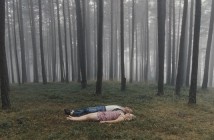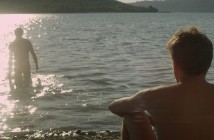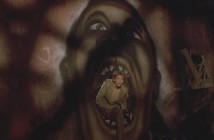An unusually high quality week supplies us with only one real clunker, everything else interesting at worst, brilliant at best. Arguably the best overall quality of any week in the series to date, it’s a great time to be a streaming viewer. Once again it’s a strong week for documentaries, over half of the selection below factual works in various styles, including two films focused on cinema itself, making this a particularly interesting selection for the cinephiles among us. With Britain, Japan, Finland, and New Zealand all represented below, it’s even better news for fans of international film, giving a real multicultural flavour to proceedings.

Watch it here
A hot topic of late for its numerous similarities to The Hunger Games, Battle Royale presents a much darker, bloodier, more cynically real-world version of a gladiatorial clash between schoolchildren. Seeing a class of kids shipped to an island to do battle to the death, the film offers a scathingly dystopian image of Japan, imagining a fantasy world not so far removed from our own. Its brutal realism is what makes it so effective: the setup may seem far-fetched, but director Kinji Fukasaku roots it all in such emotional genuineness that it’s not difficult to envisage these circumstances as a legitimate version of the future. Aided immensely by a central trio of highly skilled young actors, not to mention the legendary Takeshi Kitano as their maniacal teacher, Battle Royale thrives due to its focus not on the violence, but the little character moments nestled among the dark hillsides, quietly dreading the horrors that lie ahead. HIGHLY RECOMMENDED.

Watch it here
My attempts to convince you of Battle Royale’s greatness only pale in comparison to those of its lacklustre sequel, which truly demonstrates the brilliance of its predecessor by essentially remaking it without any of the political intelligence, character depth, or filmmaking prowess. Fukasaku sadly died in the very early stages of production, leaving his son Kenta—who penned the original—to take up the reins. That the sole scene shot by the elder Fukasaku is perhaps its only really decent one says a lot about his directorial talents, and leaves the rest of this second outing a remarkably stale effort. Changes in the rules of the game itself only lead to plot holes aplenty, and in an effort to top the first film’s shock value Battle Royale II: Requiem trades in incessant violence with little character or drama to support it. It is to Battle Royale what Aliens was to Alien, only poorly directed and supported by woeful effects to boot. AVOID IT.

Watch it here
As much a horror film as a politically-minded documentary, Gasland follows the journey of Josh Fox to investigate the effects of natural gas drilling when he is offered a sizeable sum to make his land available for the process. Uncovering in his travels across America water so contaminated it goes up in flames, animals so unhealthy their hair has begun to fall out, and people suddenly subject to frequent headaches, Fox quickly turns from casual storyteller to activist when confronted with the staggering injustice of these unaddressed outcomes. With the same sort of intimately personal narration that made Dear Zachary so compelling, Fox presents educational information with an emotional edge, weaving humanity into the abstract facts in such a way as to make them fascinating to study. A skilled visual artist additionally, his use of a variety of landscapes adds a scenic beauty to the film that transcends the technical limitations of its impromptu film crew’s equipment. HIGHLY RECOMMENDED.

Watch it here
A prime example of a film with enough earnest intention to overcome several storytelling issues, Kawa might not be a particularly well made movie—nor is it incompetent, make no mistake—but its narrative means well enough to earn the problematic aspects of its execution forgiveness. Using the proud ancestry of a Maori family as its backdrop, it tells the story of a man whose inheritance of his retiring father’s business coincides with his personal revelation that the life he has been leading as a husband and father of two is a lie. His reluctant coming out and the ensuing fallout is handled with an admirable tenderness, the material providing much of the warmth and sincerity the actors don’t always successfully convey. Though it follows a predictable arc and never dares to stray from the safety of its three act structure, the ideas it tackles are moving enough to outweigh the distinctly uncinematic approach they’re here given. WORTH WATCHING.

Watch it here
Positing your film as the Finnish equivalent to Trainspotting can surely only set you up for a fall, yet there’s a brutal honesty and unwavering gaze to Joonas Neuvonan’s documentary that sees it live up to the promise of its title. Following a group of addicts in the city of Romaniemi, painted as a bland and hopeless place to be, the film gains a pertinent sense of intimacy from the fact that these are Neuvonan’s friends, and he an addict just like them. Focusing in particular on 19-year old Jani, whose dependence on heroin-weaning drug Subutex resigns him to a life of criminal activity that eventually costs him two fingers, it’s a portrait that neither glamourises nor outrightly condemns, only quietly observes as a young man’s life is overwhelmed by his demons. Jani may never escape the grip of addiction, but Neuvonan’s eye for a cinematic shot suggests there may well be hope for him yet. RECOMMENDED.

Watch it here
When we first meet Daz, he’s hurtling down a hill in his wheelchair, competing with some bicycling kids. Each successive time we meet him, the layers of comedy are peeled back in search of the man beneath. The kind of bittersweet lower-class tragicomedy befitting of Ken Loach, Summer is an engrossingly sad watch, a beautiful lament for lost childhood and the innocence of youth. Steve Evets and Robert Carlyle play Daz and his long-time friend Shaun to perfection, as do the cast of young actors who take on the roles in various younger years. Visually stunning, the film benefits greatly from a mesmeric score by Stephen McKeon, tinged with the melancholy memories of simpler times. Kenneth Glenaan establishes himself as a director to watch, deftly juggling multiple timelines and weaving them perfectly together to stitch a rounded character study. Humbling, hypnotic, and hugely affecting, Summer is a film of complexity far beyond its seeming simplicity. HIGHLY RECOMMENDED.

Watch it here
An insightful dive into the world of one of the least appreciated forms of literature, Tales from the Script counts some of Hollywood’s biggest and smallest screenwriting names amongst its interviewees, boasting talents the likes of William Goldman, John Carpenter, Paul Schrader, and Frank Darabont. Structured around several key topics such as relationships with directors and stars, it’s a documentary bustling with humourous anecdotes and horror stories in equal measure, shedding light on the highs and lows of the movie writing business. Each of its distinct chapters begins with a clip from a film about screenwriting (such as Adaptation and In a Lonely Place), giving an interesting fictional representation of these same issues discussed at length. It may not exactly be an eye-opening experience that probes deeply into the fabric of Hollywood moviemaking, but Tales from the Script makes for an enjoyable time in the company of some truly talented and entertaining writers. WORTH WATCHING.

Watch it here
Francesca Woodman’s suicide at the age of 22 came as a shock to the world of photography, in which her name was just then beginning to gather clout. In his portrait of her life and work, director Scott Willis takes in interviews with her artist parents and brother in an attempt to gain an understanding of a complex woman, as well as a wide selection of her own work interspersed throughout. Perhaps out of respect for his subjects, perhaps out of his own moral reticence, Willis rather disappointingly never dares to suggest that the Woodmans’ insistence that their children become involved with art too had a significant hand in Francesca’s eventual fate, leaving his film to feel slightly lacking in the sort of investigative cover the story deserves. Even so, The Woodmans manages to be an engrossing and emotionally-charged watch, an intriguing glimpse into a world strange to many, and a mind sadly alien to all. RECOMMENDED.

Watch it here
Robert Weide’s documentary premiered in a 113 minute cut in cinemas across Europe in the last two months, such was its success on American television. The complete 192 minute film is a revelatory experience, combining candid interviews with the legend himself with clips from his films aplenty to give a wide overview of one of the most continuously prolific careers in cinematic history. The first part, running 110 minutes, follows Allen’s life all the way up to Stardust Memories, incorporating a good deal of material fans of his from film only will be delighted to see. The second part covers more in less time, thus making the piece as a whole feel a little less than comprehensive (some titles don’t even get a mention), but Weide paints a significant portrait of a significant artist that should please the uninitiated and devoted alike. If nothing else, it instils a distinct hunger to rush off and watch the likes of Manhattan, and when has that ever been a bad thing? RECOMMENDED.



